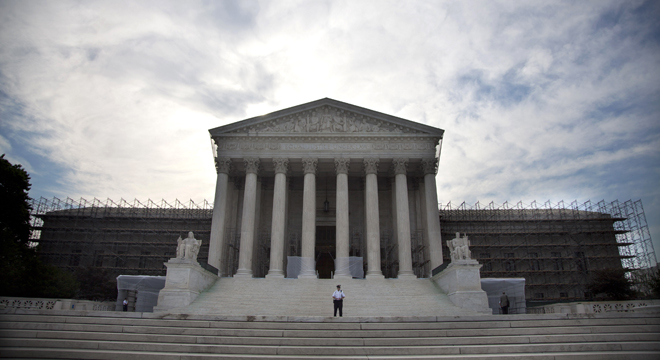The Supreme Court declared Friday that it will take up same sex marriage next year in what’s sure to be a blockbuster case with sweeping implications.
The Court accepted a challenge to the Defense of Marriage Act, the 1996 law that prohibits federal recognition of same sex marriage. Two appeals courts have ruled that Section 3, which effectively bans same sex couples legally married in their states from receiving federal benefits, is invalid under the Constitution’s equal protection clause.
Oral arguments will be next spring and a decision is expected by the end of June.
The Court agreed to hear the Windsor v. United States case, which was brought by a lesbian widow. The Second Circuit Court of Appeals invalidated DOMA in a 2-1 decision finding that the federal government did not have a legitimate interest in treating same sex couples differently.
It’s another legacy-defining case for the Roberts Court and extraordinarily tricky one. The rapidly growing public support for same sex marriage in many parts of the country leaves little doubt that it will eventually be legalized in a substantial number of states. For gay marriage supporters, however, DOMA, signed by Bill Clinton, remains a political roadblock at least so long as Republicans control the House of Representatives. That leaves the federal courts as the best avenue for eliminating the law. The question is whether the justices will lead the way or leave the roadblock in place.
“I don’t think justices get in this position very often because everybody knows what the judgement of history is going to be,” Lucas Powe, a Supreme Court historian at the University of Texas-Austin School of Law, told TPM before the court’s announcement. “I don’t think think anybody doubts that gay marriage is coming — it’s only the issue of time. This is one of those times where no matter what you think you know you’re going to be wrong if you oppose it.”
The Supreme Court has not weighed in on gay marriage, leaving the outcome uncertain, but earlier rulings in favor of gay rights give hope to proponents of marriage equality. The four Democratic-appointed justices are widely expected to strike down DOMA. Justice Anthony Kennedy, a presumable swing vote, has written passionately against laws persecuting gays.
“I think Kennedy’s vote is very secure,” Powe said. “I think there are comfortably five votes to overturn DOMA. … Kennedy has a libertarian streak — he has written the key gay rights opinions and I think he will continue to do so.”
Brian Fitzpatrick, a professor at Vanderbilt University School of Law and former clerk to Justice Antonin Scalia, told TPM ahead of the announcement that “conservatives are probably afraid they will lose Justice Kennedy.”
The vote of Chief Justice John Roberts is also uncertain. He’s believed to be personally skeptical of gay marriage, but may be motivated to get on the right side of history.
“I would expect Roberts to add to his liberal credibility by joining the majority opinion,” Powe said, even though “he’s a conservative Catholic, he comes out of the Republican social conservative movement, so I assume he’s against gay marriage.”
While House Republicans have spearheaded the legal defense of DOMA, they’ve been largely quiet about it, partly because some of their strategists want to change course.
Earlier this summer, days after President Obama came out for same sex marriage, top Republican pollster Jan van Lohuizen wrote a memo imploring his party to get behind the cause or risk political extinction. He warned that support for gay marriage is growing across partisan lines and “at an accelerated rate with no sign of slowing down.”
Also on Friday, the Supreme Court agreed to hear a challenge to Proposition 8, the California ballot measure that amended the state’s constitution to ban recognition of same sex marriage.










